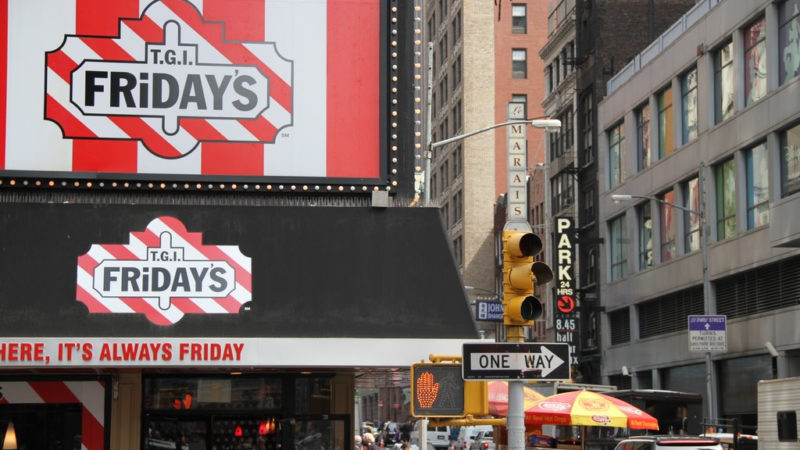Is the American diner set to see its first wave of strike action in the UK?

TGI Fridays, the American dining chain famed for its burgers and cocktails is facing a wave of rolling strikes as workers prepare to vote over tip and minimum wage abuses, starting in Milton Keynes and Covent Garden in London next week.
These are the first ever strike ballots to hit the casual dining chain which opened its first restaurant and Birmingham in 1986, and comes in the same week as McDonalds workers announced further strike ballots in another six stores, building on their historic strike last September.
So what has pushed this mainly female workforce, some of whom have worked as waitresses at TGI Fridays for years, to contemplate strike action now?
It started back in January when waiters were given just two days’ notice that they’d be losing 40 per cent of their tips paid via a card. There had been no consultation.
The decision caused wide spread anxiety as the waiters grappled with losing a sizeable chunk of their weekly income effectively overnight.
Since then TGI Fridays management has wilfully ignored the damage caused by this decision. It has refused to meet with workers or listen to their concerns, publicly arguing that giving 40 per cent of card tips to the kitchen teams is about fairness.
But to be clear this has nothing to do with fairness – it’s about using tips to subsidise kitchen staff wages, which have not kept pace with rises in the national living wage and to address high staff turnover in the kitchen.
The decision has also raised serious concerns about the way tips and service charges are shared out, and the systems used to do this. Under HMRC guidelines (E24) these are supposed to be independent of the company, but most are not. This is something Unite is investigating alongside the industrial action ballot.
The way the company has handled itself, has also revealed a catalogue of bad practice from the use of unpaid trial shifts, and breaches to minimum wage legislation that can’t be ignored. It’s also hardly surprising that a company which can so easily shrug off its staffs’ concerns topped the government’s list of companies named and shamed for failing to pay 2,302 workers the national minimum wage.
TGI Fridays was once a pretty good employer. It was one of the first to sign up to the Unite and Mirror newspaper Fair Tips Charter back in 2009. But since the introduction of the government national living wage in 2016, it has steadily chipped away at workers’ benefits and perks. Last year, a new contract was imposed that got rid of their overtime premiums and other benefits.
So it’s little wonder that by the time waiters were told that they’d be losing 40% of their card tips to the kitchen earlier this year, they’d had enough. The fact that the trial group were given just 48 hours’ notice that they’d be losing as much as £100 week because of the tip policy change didn’t help. Nor did the fact that the helpline included in the letter didn’t work.
It’s not, as the company likes to make out, that they don’t want to share. They already give 20% of their tips to the bar staff and serving assistants. They just don’t think they should have to subsidise kitchen staff wages, which haven’t kept pace with rises to the government’s national living wage. And who can blame them.
These (generally) waitresses are paid the minimum wage or the national living wage of £7.83p/h, if they’re over 25, and rely heavily on tips to pay their bills. It is the company’s responsibility to pay its kitchen staff a wage they can live on, tips should not be used to top up their wages.
But this action is about much more than a change in tip policy. It’s about standing up to an employer that thinks it can get away with bulldozing through changes unchallenged. It’s also about challenging a rotten system built on low pay and exploitation and saying: ‘Hey, we will not be ignored or exploited anymore.”
TGI Fridays management point blankly refused to hear a collective grievance signed by workers at over 30 branches. They even rejected an approach by ACAS to settle the dispute. Instead of addressing our members’ concerns in a constructive way, they have sought to kick the can down the road.
TGI Fridays is now paying the price for that.
It is also now nearly two years since the government launched a consultation into tipping abuses, after Unite’s campaign against Pizza Express sparked a huge media backlash. We had high hopes that, at the very least, rip off tip scams would be banned and workers would get a proper say in how tips and service charges are shared out.
Instead, in the two years since the consultation closed on 27 June 2016, there has been an explosion in new tipping abuses. The government needs to show it is on the side of TGI Fridays and McDonalds workers and all those like them, and release its report.
Standing up for your rights and challenging bad practice is hard, particularly when the threat of having your shifts cut or losing your job looms over you. It takes courage to fight back, which is why these TGI Fridays’ workers and the McStrikers deserve our respect. Unite is proud to support them and is urging workers to join the union to take part in the strike ballot.
Dave Turnbull is the regional officer for Unite the Union.
To reach hundreds of thousands of new readers we need to grow our donor base substantially.
That's why in 2024, we are seeking to generate 150 additional regular donors to support Left Foot Forward's work.
We still need another 117 people to donate to hit the target. You can help. Donate today.



